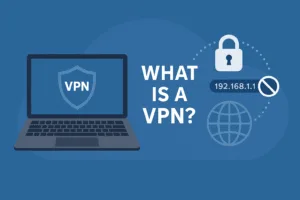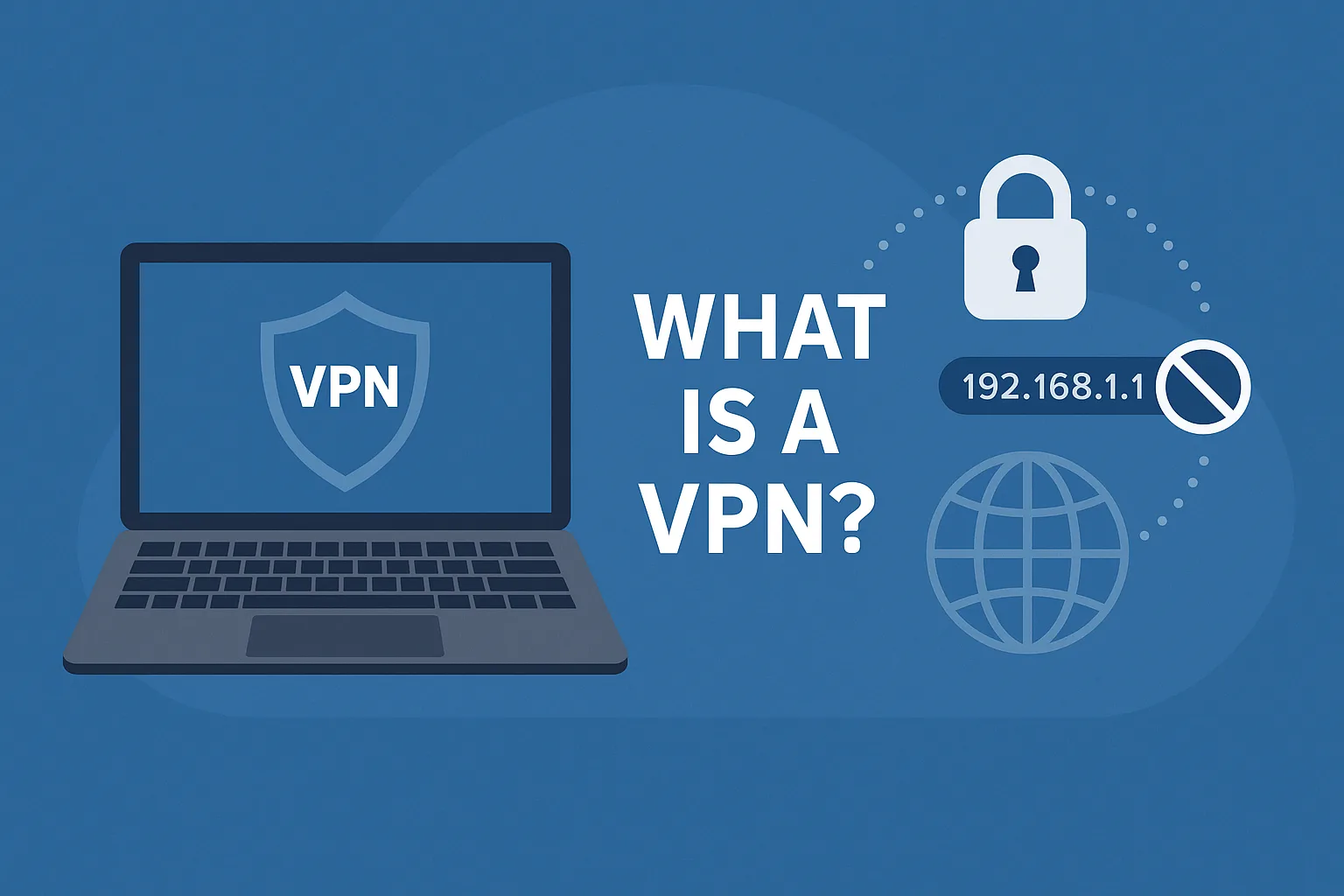25, May 2025
What Is a VPN? How It Works & Why You Need One Today
My dear friends, today I will talk about VPN. Today we will know how VPN works and how to use them, and Why You Need. So let’s talk about the VPN.

What is a VPN? (VPN Explanation)
VPN stands for Virtual Private Network, and perhaps you’ve heard that term in relation to security and geolocation. But what exactly is it, how does it function, and what can it do for you? Well, let me explain.
How the Internet Works (Before VPN)
Now, before we jump into VPNs, let me explain a bit about how the internet works. At home, you’ve probably got some sort of router or modem from your phone company or your internet service provider. That is connected to your desktop, maybe by an Ethernet cable, to your phone over Wi-Fi, or to your laptop over Wi-Fi, etc.
Inside your home, when your laptop talks to your computer or your phone talks to your computer, that is a part of your private network. It doesn’t go out onto the internet — it stays inside your home. But the moment you open a page on the internet, that data moves through your modem into your local phone company and then out over the internet. It will traverse the web until it gets to the server. The server will then answer with some information that returns through the web to your local telecommunications provider, down through your modem, and back onto your computer or smartphone.
What is an IP Address?
While all that data is rushing around the web, it has to know where it’s going. To do that, every piece of data needs an address — just like the postal service. These are known as IP addresses. You’ve probably seen them: four digits from 0 to 255 with dots between them — for example, 178.34.67.120.
Your modem or router is assigned an IP address from your ISP. Every server or router your data touches as it travels the web knows that IP address. When it reaches a website server, it logs that IP address and the information you requested — not because it’s spying on you, but to collect analytics like visitor count, peak times, etc.
IP addresses are assigned in blocks. That means your IP is similar to that of your neighbors. There are databases that can tell where these IP blocks are located, sometimes even down to a few blocks from your home.
If you don’t believe me, go to WhatIsMyIPAddress.com — it will show you what info can be found about you from just your IP address.
Why Should You Care?
Usually, it’s not a big deal if you’re just visiting Twitter. But what if you’re researching something sensitive — like a personal issue or a culturally taboo topic? Then the server you visit knows your IP, and so does your ISP. Most governments have legal systems that allow them to request your personal info based on IP address and browsing history. Depending on the country, this can happen quickly or under strict rules.
It’s not just governments you should worry about. Public Wi-Fi — like in coffee shops — is extremely risky. Anyone with some tech knowledge can sit in a cafe and intercept the unencrypted data flowing through the air. They can grab passwords, URLs, and even content from emails.
Even with apps like WhatsApp that offer end-to-end encryption, it’s still dangerous to do online banking or visit PayPal on public Wi-Fi. Just don’t do it.
Geolocation and Regional Restrictions
Let’s say you’re traveling and want to access a streaming service. If you’re outside the country, you might be blocked from viewing content. The streaming server checks your IP and sees it’s from another country.
Even pricing changes based on geolocation. ExpressVPN recently found that the price of the same flight ticket varies depending on your IP location. This is called geo-fencing and affects how we access content and services online.
How Does a VPN Help?
A VPN creates a secure, encrypted tunnel between your device and a server elsewhere in the world. When you access the internet through this tunnel, your IP is replaced with the VPN server’s IP.
Here’s what that means:
Your local ISP and government can’t see what websites you’re visiting — it’s all encrypted.
The website you visit sees the IP of the VPN server, not your real IP. It thinks you’re in a different country.
On public Wi-Fi, your data is encrypted, so hackers can’t intercept it.
How to Use a VPN
First, you need a VPN service. There are many available online. I personally recommend ExpressVPN — they’re great.
When you subscribe, you get a username, password, and a list of servers in Europe, the US, South America, Asia, and more. You can choose the country/server you want to connect to.
On Android, ExpressVPN has an app. Just install, log in, and tap the server you want.
On Windows or macOS, you can either use the app or manually create a VPN connection from settings.
VPN Features
Save your personal data
Save from hackers
You can hide your IP address
Etc.
Conclusion
If you have any questions, please comment down this post and tell me if I made a mistake so that I can correct it. Thanks for reading…

Post A Comment